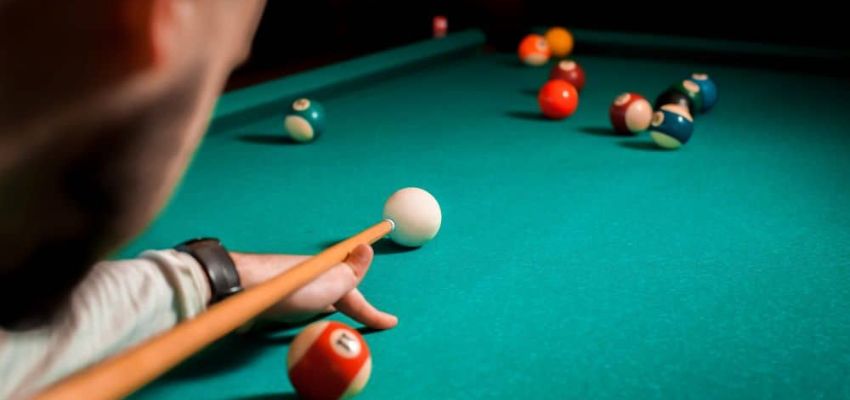
How To Play Pool By Yourself: Top 4 Expert Tips
Introduction
Learning how to play pool by yourself seems like an art! There are many different games, rules, and tips to learn beyond sinking your balls into the pocket. However, you will have so much fun playing pool alone that you forget all about that. To start learning and honing your pool skills, read on.
Before Playing Your Single-Pool Game
Generally, you need the following essential equipment: a pool table, a pool cue, pool chalk, and pool balls.
Preparing Your Pool Table
You can play one of three standard pool table sizes: 7, 8, and 9 feet (2.7 m). As the American Billiards Congress defines, a "regulation" pool table is any table that is twice as long as it is wide. For example, an 8-foot table is 8 feet long and 4 feet wide.

A wooden pool table. Image source: Sean Woolsey Studio.
Notably, if you are playing on a larger table, you may need a longer cue.
Preparing Your Pool Cue
Choose a pool cue that fits your size (or height), preferences, and skill level. For example, most adults feel comfortable with a cue that is a length of 58 inches. The 58-inch cue fits most adults and older children perfectly. Consider choosing one of our Big Cat cues to maintain the smoothness of your solo play.

Big Cat cues combine a simple yet timeless design with superior Canadian Maple materials that withstand the test of time.
The tip is also an essential part of your cue, as it connects the cue and the balls (similar to tires on a car). It would help to use a tip with the same diameter as the ferrule of your cue.
Preparing Your Pool Balls
The set of balls depends on the pool game you plan to play. Therefore, you must read the pool rules carefully to choose the correct set of pool balls.

An 8-ball set. Image source: Pinterest.
To remove dirt on the surface of your billiard balls, use a microfiber cloth to moisten each ball in the cleaning solution. Then, scrub gently to ensure effective cleaning.
Meanwhile, harsh chemicals or corrosive cleaning solutions can damage the surface of your billiard balls.
Preparing Your Pool Rack
Before starting the game, you arrange your balls on the table using a tool called a rack.
Each billiard game variation has a specific method for racking the balls. Learning how to rack pool balls, including the 8-ball, 9-ball, 10-ball, and straight pool, is ideal.
Preparing Your Pool Chalk
After a long period of playing, the tip of your cue becomes worn out, making it difficult to control the cue ball accurately. At this point, you need a pool chalk. It provides motion resistance between the cue and the spot, which helps prevent miscues.

Pool chalk gives your cue enough friction to make a tricky shot. Image source: Pinterest.
So, how do you play pool alone even if you don't have anyone else? Here are our recommendations:
Rules Of How To Play Pool By Yourself
The rules for playing pool by yourself depend on the game you intend to play. Let's stick to the standard 8-ball pool.
- You rack the balls the same way you would play against a partner.
- To start playing, you need to break the balls.
- If you pocket a striped ball first, you play stripes, and vice versa.
- First, you must get all the striped balls into the pocket, then all the solids, and finally, the 8-ball.
- Pick which ball you want to play first during a break if you pocket solid and striped balls simultaneously.
How to Practice Playing Pool by Yourself
1. Focus on the basics
When practicing pool by yourself, starting from the basics means perfecting your stance, ensuring your body is correctly positioned with your head aligned with the cue and your dominant foot slightly forward.
During this phase, players need to pay close attention to their grip and stroke to ensure a relaxed hold and a smooth, consistent motion. These basics form the foundation of your game and should be regularly revisited in your solo practice sessions.
2. Try the "ghost ball" drill
Put two balls on the table, one white and one colored. It’s like Imagining there's an invisible ball touching the colored one. Then, try to hit this imaginary ball with the cue ball. This practice will help players aim for better and more accurate hits.
3. Work on controlling
This step requires players to practice their control, where the cue ball goes after you hit a shot. Put two balls on the table again. Choose a pocket for the colored ball and where you want the cue ball to end up. Then, consistently hit the colored ball into the pocket while getting the cue ball to stop where you want it.
4. Practice the bank and kick shots
Bank shots and kick shots are shots that bounce off the sides of the table. Practicing these will help players deal with balls in tricky positions. However, this step requires a longer time to master as it is difficult for starters to get used to different ball positions. So, set up some of these shots and keep practicing until you can make them consistently.
5. Record your progress
Finally, keep track of how you're doing. Write down what you practice and how well you do. Or, you can use an application on your phone or any device to record actual progress. This helps you see where you're getting better and what you need to work on more. It also keeps you motivated to keep improving.
10 Pool Games You Can Enjoy Yourself
Solo 8-Ball
8-Ball Pool is a traditional billiards game familiar to most billiards players. Two players usually play this game. However, you can enjoy it alone. Here are some steps for you to play 8-ball by yourself:
- You rack all 15 object balls on your pool table.
- You use the cue ball to make a break. Then, you pocket all seven striped and solid balls, or you can change this order.

8-ball is an ideal choice for your solo pool play. Image source: Canada Billiard.
One Pocket Pool
You can play a one-pocket pool against yourself by racking up 15 balls and trying to sink them in various pockets.
Playing this game alone is a great way to practice accurate aiming skills. Before taking any shot, you must name the pocket where you want to sink the ball. For example, your pick is the "corner pocket”.
3-Ball Pool
You aim to pocket three object pool balls in the fewest shots possible. To play the 3-ball pool game alone, set up three object balls in a triangle rack on your pool table. Try to sink three object balls in as few efforts as possible.
- An opening break is considered a shot.
- A miss is regarded as two shots.
Solo 9-Ball
Nine-ball is another intricate and fun pool game that you can play solo. To win the game, you must sink all nine object balls in order of the 9-ball pool rules.
In a general pool, an object ball is any ball hit by the cue ball.
Target Pool
The target pocket game aims to help you practice your cue ball control and aiming skills comprehensively. This pool rule is more relaxed than some other billiard games.
You don't need to set up the ball in a rack. Instead, you can choose any balls and place them anywhere on the table pool. Practice hitting your object balls into various pockets from different challenging angles.
Fifteen In A Row
Another fun and challenging game to play alone is a fifteen-in-a-row pool (or 15 balls). This game helps you improve your skills, as your goal is to pocket all fifteen balls without missing one.
Before playing, you must arrange the balls in a triangle like an 8-ball pool. To start the game, you break the balls. Then, you have to sink one ball per turn in any order.
The game ends if you miss any pocketing shots.

In the fifteen-ball game, you rack the balls the same way as 8-ball rules. Image source: MPL.
Speed Pool
The rules of the speed pool are straightforward. Within a time limit, you must sink as many balls as possible. Here are some steps to play speed pool by yourself:
- You rack your 15 balls according to 8-ball pool rules.
- You set a timer for a certain amount of time.
- You press the timer button and make a break.
- Then, you try to get as many object balls into the pocket as possible.
- You keep shooting until the timer stops. Finally, you count the number of balls you have sunk.
You can pocket the object balls in any order or according to solo 8-ball pool rules.
Backward Pool
Backward pool, or Chinese-style billiards, is played with a 16-ball set, including one cue ball and 15 numbered balls. This solo pool game aims to improve your shots by applying ball trajectories and angles.
To play backward pool, you should follow these steps:
- You rack your 15 numbered balls based on regular 8-ball rules.
- You executive a break as you do in 8-ball.
- The difference between a backward pool and other pools is that you use a numbered ball to hit the cue ball.
- After hitting the cue ball, the numbered ball bounces back. Finally, it falls into the pocket.
Bowlliards
Bowlliards is another funky and straightforward game on our list of 10 solo pools. It originated from the game of bowling.
In this pool game, you rack ten balls instead of all 15. The opening break counts as one shot. You have ten shots to pocket as many of the ten balls as possible. The trick here is to try to make a "strike" to pocket all ten balls in the smallest number of shots.
Cowboy Pool
Cowboy pool helps you improve your playing skills in many positions and angles.
This game aims to pocket eight object balls by hitting the cue ball first. You hit the object balls so they can hit your cue ball before falling into the pocket.
To play cowboy billiards alone, you line up eight object balls in the typical 8-ball manner. Then, make a break shot aiming to hit the object balls so they push the cue ball into the pocket.
4 Tips To Make Your Pool Playing Skills Better
Improve Your Stroke

Practice your stroke regularly to get perfect straight shots. Image source: AzBilliards Forums.
The earlier you try to work on your stroke, the better you will be. Start improving your stroke to perform a straight cue ball shot with power.
- Practice your stroke in various drills and solo games to get the perfect straight shot.
- You can also practice an accurate shot by aiming and hitting the ball from multiple positions and angles.
- Practice switching your eyes from the contact point on the cue ball to the target point on the object ball.
- Before you shoot, turn your foot about 45 degrees so your back foot is on your imagined center line. Your back foot is your right foot if you're a right-hander.
- Keep your balance and ensure your arms freely move when making an even cue stroke.
Enhance Your Shots
A common pool-playing mistake among beginners is shooting too hard. That makes your shot less accurate and even ruins your pool game.
- You can improve your touch by making shots that sink the ball into the pocket at various distances. Select carbon fiber shaft cues to make your shots as soft as possible.
- Before practicing complex shots, you need to control the force of your arms by making gentle, controlled strokes.
- It will take some practice. As you focus on holding the cue comfortably and maintaining your balance, you start to see your shot improve!
Stay Calm
Nothing is more helpful than patience and calm. Every great pool player was once a beginner.
Keeping control of each shot alone is the best way to become calmer in a multiplayer pool game.
The best pool players are relaxed because they can think creatively about their shots. Staying patient and taking your time will indirectly improve your performance in most games.
Take Your Time
Precious things always require time and dedication. Solo play is an opportunity to develop strategic abilities without worrying about defense. For example, you can spend five minutes focusing on crucial shots.
You can make significant progress in your billiards game by taking the time to control and analyze each shot. It is vital when practicing complex techniques or getting used to new pool game equipment.
If you aim to improve your billiards skills, you need to spend many hours practicing. However, sometimes, this pressure can take away your excitement. Knowing how to rest and manage your time off is equally important.
Frequently Asked Questions
Can you play pool by yourself?
Yes, it is okay to play pool by yourself. Solo pool playing progresses based on what game you want to play. For example, if you play 8-ball alone, you rack the balls and take a break. Then, you pocket the balls like you are playing against someone else.
How can I practice pool without a table?
To practice playing pools without a table, you should understand pool game rules and review your shots with a mirror.
How can I practice eight balls by myself?
To practice the 8-ball game alone, you can rack all 15 object balls. Then, you make a break and use the cue ball to pocket object balls. You can pocket seven solids or seven stripes first. It’s up to you.


